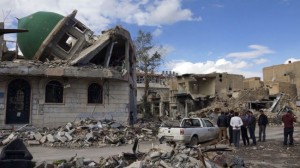 (Reuters) -�Russia�accused the West on Sunday of trying to exploit a chemical weapons deal with Syria to push through a U.N. resolution threatening force against President Bashar al-Assad.
(Reuters) -�Russia�accused the West on Sunday of trying to exploit a chemical weapons deal with Syria to push through a U.N. resolution threatening force against President Bashar al-Assad.Assad's government has handed over information about its chemical arsenal to a U.N.-backed weapons watchdog, meeting the first deadline of the ambitious U.S.-Russia accord which the U.N. Security Council is due to endorse in the coming days.
But major powers on the council, who have disagreed throughout a conflict which has killed 100,000 people, remain divided over how to ensure compliance with the accord.
The United States,�France�and Britain want a council resolution issued under Chapter 7 of the U.N. charter, which could authorize sanctions or military intervention if Damascus reneges on its commitments.
Russia, which along with�China�has blocked three draft resolutions on Syria since the 2011 uprising against Assad erupted, opposes Western threats of force against an ally which Moscow has continued to arm and support during the civil war.
"They see in the U.S.-Russian deal not a chance to save the planet from significant quantities of chemical weapons in�Syria, but as a chance to do what Russia and China will not allow, namely to push through a resolution involving (the threat of) force against the regime and shielding the opposition," Russian Foreign Minister Sergei Lavrov said.
Lavrov also said Russia, was ready to send troops to Syria to ensure the safety of U.N. chemical weapons inspectors.
"An international presence is needed on the perimeters of the areas where the experts will work," he said. "We are willing to send our troops and military police to participate.
"I do not think that there is a need for a major contingent. I think military observers will be sufficient."
Assad agreed to destroy Syria's chemical weapons after a sarin gas strike in Damascus suburbs last month - the world's deadliest chemical attack in 25 years.
Washington accused Assad's forces of carrying out the attack, which it said killed more than 1,400 people. It said a report by U.N. chemical weapons experts last week supported its view - an assertion which Moscow disputes.
Assad blamed rebels for the attack, saying it made no sense for his forces to use chemical weapons when they were gaining the upper hand and while U.N. chemical inspectors were staying in central Damascus.
HOPES FOR PEACE TALKS
While the chemical deal paves the way to the destruction of 1,000 metric tons of mustard gas, VX and sarin which security experts believe Syria possesses, the rare instance of U.S.-Russian cooperation has also raised hopes of a revived international push for a political solution to the wider Syrian conflict.
A letter seen by Reuters on Sunday from the head of the Syrian Coalition, Ahmad Jarba, to the U.N. Security Council revealed he had committed his group for the first time to attend a proposed Geneva peace conference - on condition that it aims to establish a transitional government with full powers.
The coalition had resisted pressure to go Geneva, especially after the August 21 chemical weapons attack.
Jarba's letter said the coalition "reaffirms its willingness to engage in a future Geneva Conference" on condition that the conference will aim for "the establishment of a transitional government with full executive powers," as set out in the first international accord on Syria in Geneva a year ago.
His comments mean that both Assad's government and the main political opposition have agreed in principle to attend the peace talks. However their conditions for participation still appear far from reconcilable.
Rebels and the political opposition insist Assad can play no role in a transitional authority, while the government has ruled out conceding power to its opponents.
Jarba's coalition also has very limited influence over the fighters inside Syria, particularly the increasingly powerful Islamist brigades and al Qaeda-linked groups.
The rebels, fighting to end 40 years of Assad family rule, were angered by the U.S.-Russian accord to eliminate Syria's chemical weapons, saying it has distracted the world while Assad deploys a large conventional arsenal to crush his foes.
They had hoped the United States would launch air strikes against Assad which they could use as a platform to retake territory from Assad's forces after they were forced on the defensive on several fronts in recent months.
In central Damascus, a mortar shell struck the Russian embassy compound on Sunday, wounding three employees, the Foreign Ministry in Moscow said. None of the injuries were serious, it said in a statement.
By Reuters
The Iran Project is not responsible for the content of quoted articles.










